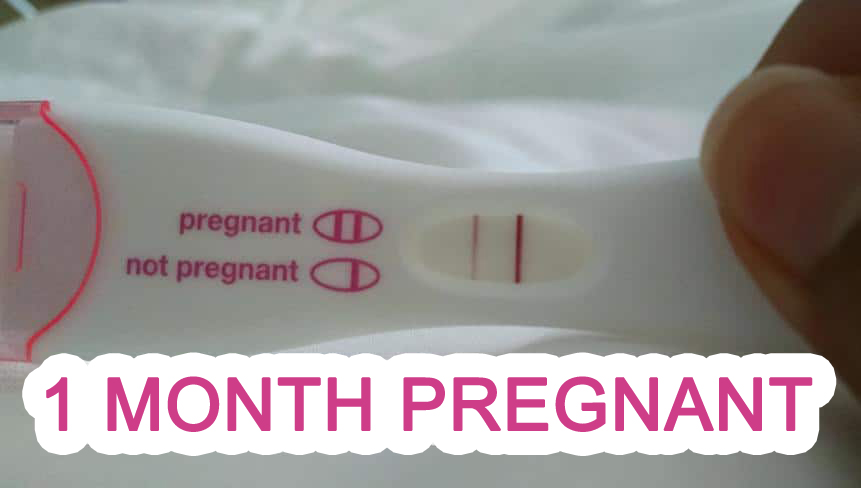Welcome to the untrodden path of pregnancy, glowing moms-to-be! This article is your one-on-one guide through the initial roller coaster ride of the magical journey – your first month of pregnancy. Navigating through the waves of anticipation and uncertainty, this comprehensive guide will reveal key insights about symptoms you may encounter, walk you through the development stages, and provide intriguing details about baby care methods, all tailored for this very first phase. Amidst surges of emotions and a whirlwind of questions, let us be your anchor as we unravel the start of an exciting chapter in your life. Your thrilling journey into motherhood starts here.
At one month pregnant, common symptoms may include a missed period, mood changes, bloating, cramps, spotting, frequent urination, sore breasts, fatigue, nausea, constipation, and food aversions. During this time, the fertilized egg implants in the uterine lining and internal organs, bones, and limbs start to form. It’s important to focus on overall health and nutrition by taking a prenatal multivitamin and engaging in safe exercise. However, please consult with a healthcare professional for personalized advice.
Table of Contents
Understanding 1 Month Pregnancy
Congratulations! You’ve just found out that you’re expecting. The first month of pregnancy is an exciting but also a scary time for many women. It’s the beginning of a unique journey, and there’s so much to learn and appreciate about this delicate period. During this first month, the fertilized egg implants in the uterus’s lining, and internal organs, bones, and limbs start to form. An ultrasound at four weeks can confirm pregnancy and give you an estimated due date.
Pregnancy Test Confirmation and Symptoms
At one month pregnant, you may not notice any significant changes to your body yet. However, many women experience typical early pregnancy symptoms such as missed periods, mood swings, bloating, cramps, spotting, frequent urination, sore breasts, fatigue, nausea, constipation, and food aversions [TABLE]. If you suspect that you might be pregnant or have taken a home pregnancy test that indicated a positive result, it’s essential to schedule an appointment with your healthcare provider for confirmation.
It’s vital first to take a quick trip to the pharmacy for a home pregnancy test kit. These kits are affordable and readily available over-the-counter. A positive result will typically mean that hCG (human chorionic gonadotropin) hormone levels were detected in your urine. However, sometimes false negatives occur if testing exercise was not done correctly.
Once you’re sure about being pregnant through a doctor’s confirmation of results from pregnancy tests or other methods , you can start learning more about pregnancy generally. Remember that every woman’s experiences are different; some are lucky enough to go without morning sickness while some experience it throughout their pregnancies. Your medical provider will guide you on the best practices to stay healthy and ensure a healthy delivery.
Common Physical Changes
During the first month of pregnancy, your body may start to undergo several changes as it prepares to nourish and support a growing fetus. These changes can vary from person to person, but some common symptoms include missed period, mood changes, bloating, cramps, spotting, frequent urination, sore breasts, fatigue, nausea, constipation, and food aversions.
It’s essential to focus on overall health and nutrition during this time as well. While there may not be noticeable changes to the body yet, taking a prenatal multivitamin and engaging in safe exercise can be beneficial.
For example, consider swapping your daily coffee for a glass of milk or water to stay hydrated while minimizing caffeine intake. Small decisions like these can make a significant impact on your overall health and that of your baby.
- During the first month of pregnancy, it is common to experience a range of symptoms such as missed periods, mood changes, bloating, cramps, spotting, frequent urination, sore breasts, fatigue, nausea, constipation, and food aversions. Taking care of your overall health and nutrition during this time is crucial. Incorporating prenatal multivitamins and safe exercises into your routine can be beneficial. Making small changes like swapping coffee for hydrating beverages can have a significant impact on your well-being and the health of your baby.
1st Month Fetal Development
During the first month of pregnancy, rapid changes occur in the development of your growing fetus. Although the baby is only about ¼ of an inch long at this stage, internal organs, bones, and limbs start to form.
The fertilized egg implants in the uterine lining soon after conception occurs. The embryonic stage begins during this period and lasts up until week five. The cells divide continually while they grow and differentiate into various parts of the embryo.
Think of this stage like laying a foundation for a house – crucial for its future strength and stability. Similarly, during fetal development in the first month early growth lays the groundwork for the baby’s developing nervous system and other critical organs.
Around week four of fetal development (roughly two weeks after conception), heart formation begins. By weeks five or six – although still very tiny – the heart will begin to beat rhythmically.
With these physical and developmental changes in mind throughout this month-long journey let’s explore what you need to do from here.
Embryonic Stage and Heart Formation
The first month of pregnancy is an amazing time for the development of your little one. At this stage, the fertilized egg implants in the uterine lining, and internal organs, bones, and limbs start to form. By week four of the pregnancy, the baby’s heart begins to beat. It starts as a tiny tube-like structure that pumps blood to and from the placenta. As the heart continues to develop, it separates into chambers, grows stronger, and eventually becomes capable of supporting life outside the womb.
Just think about it; in just a few short days since conception, cells are dividing at a rapid rate, a heartbeat has formed and will continue to beat for years to come! It’s incredible how much happens in such a brief period.
With all these remarkable changes happening inside you, it’s vital to make some dietary and lifestyle adjustments that ensure both mom-to-be and baby are healthy.
Dietary and Lifestyle Adjustments
There may not be noticeable changes to your body yet; however, making important dietary adjustments from the beginning can help ensure that both mom-to-be and baby are healthy throughout this critical period.
For starters, taking a prenatal multivitamin is crucial as it helps provide essential vitamins like folic acid that prevent birth defects like spina bifida. During this time focus on whole foods as they provide necessary nutrients needed by you and your growing child. Drinking enough water is also vital for digestion and nurition delivery.
It’s also important to avoid certain foods during pregnancy – soft cheeses or raw fish – as they increase the risk of foodborne illnesses like listeria or mercury poisoning.
Engaging in safe exercise like walking or swimming can help control weight gain while providing benefits that include boosting mood levels; lower risk gestational diabetes; improving circulation.
Finally, quitting smoking, drinking alcohol or any other harmful substances protect the baby’s health and development, while reducing risks of complications and long-term health effects. Encouraging your partner to quit or join in avoiding unhealthy habits is recommended as well.
Remember, while there may be a lot of information available, it’s essential to work closely with your prenatal healthcare provider and follow personalized advice when making the right choices for your pregnancy.
Think of dietary adjustments like tending to a garden. You want to provide nutrients that foster healthy growth without any unwanted pests; establishing healthy habits early can help create the best environment.
- According to the American Pregnancy Association, around 25% of pregnant women experience slight bleeding or spotting during their first month.
- The Centers for Disease Control and Prevention states that fatigue affects approximately 90% of women in early pregnancy, reflecting hormonal changes occurring during the first trimester.
- A study published in the Journal of Obstetric, Gynecologic, & Neonatal Nursing found that more than half of pregnant women experience nausea or vomiting in the first trimester, commonly beginning around the six week mark. For many women, this may resemble what is often termed ‘morning sickness’, a common symptom that can actually occur at any time during the day.
Recommended Nutrient Intake and Safe Exercise
At this early stage of pregnancy, the baby’s development will be rapid, and proper nutrition is vital for fetal growth. It’s essential to ensure that your diet is healthy and well-balanced. Aim to incorporate iron-rich foods such as spinach, broccoli, and lentils, which help with adequate blood formation. Folate, Vitamin D, and Calcium are other essential nutrients for a healthy pregnancy. While it may be difficult to get all the necessary nutrients from food alone, a prenatal multivitamin can help fill in any gaps.
To illustrate an example meal plan, breakfast could include whole-grain oatmeal with nuts and fruit. Lunch could consist of a turkey sandwich on whole-grain bread with veggies and avocado spread along with a side of yogurt or cheese stick for protein and calcium intake. Dinner might include grilled salmon or roasted chicken breast with roasted vegetables.
In terms of exercise, pregnant women are advised to engage in safe exercise for optimum health benefits for themselves and the baby. Low-impact activities such as walking, swimming, yoga or Pilates under supervision are advisable during early pregnancy. Women who were previously active should consult their healthcare provider before continuing any prior high-intensity workouts.
With proper nutrition and safe exercise practices in mind, let’s consider some essential tips and cautions for expecting mothers.
Essential Tips and Cautions
It’s important to establish good habits during the first trimester towards optimum health outcomes later on in pregnancy. Some pointers for moms-to-be include consulting a prenatal healthcare provider early on (within the first month) and scheduling follow up visits regularly.
Think of it like planting seeds; starting off strong leads to healthier growth.
Expecting mothers should avoid drinking alcohol or smoking as these substances could have severe implications on fetal development and have long-term negative effects even after birth.
Furthermore, as the body undergoes significant changes internally, it’s crucial to listen to your body, rest, and manage stress levels. It’s also advisable to read up on potential symptoms and familiarize oneself with signs of an ectopic pregnancy (a rare condition that can be life-threatening) such as sharp abdominal pain with vaginal bleeding.
Finally, remember that pregnancy symptoms can come and go. Try to maintain a positive outlook; most women experience healthy pregnancies and deliver healthy babies.

Elizabeth Baker is a mother of three, wife, and the passionate mind behind this pregnancy and baby development resource. She balances her love for understanding every stage of child growth with her duties as a parent. When she’s not sharing her experiences or studying child development, Sarah enjoys family time, reading, and practicing yoga. She believes in the power of shared knowledge to enhance the beautiful journey of parenthood. Read more About me.
